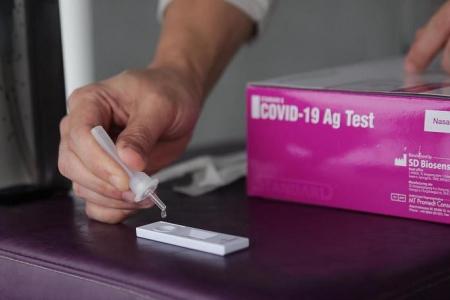Getting second Covid-19 infection not more dangerous, say S’pore experts rebutting US study
An American study suggesting that people who are infected with Covid-19 a second time are at higher risk of organ failure and death is questionable, with inherent limitations and overstated conclusions, say local experts.
The retrospective study by the Washington University School of Medicine and the Veterans Affairs (VA) St Louis Health Care System looked at nearly 41,000 VA patients who had two or more documented infections and 444,000 who were infected for the first time, out of a total patient population of 5.8 million.
Using statistical modelling, the researchers concluded that patients with reinfections were twice as likely to die and three times more likely to be hospitalised than those infected for the first time.
Professor Ooi Eng Eong, an expert in emerging infectious diseases at the Duke-NUS Medical School, said he was “appalled at how this study got through peer review” and was published in Nature Medicine journal last week.
The study said those reinfected were 3.5 times more likely to develop lung problems and three times more likely to suffer heart conditions. Prof Ooi pointed out that the study provided “very little information on what chronic diseases the cases with reinfection had”.
Nor did it look at patients who had other respiratory infection to find out if the higher risk is Covid-19-specific or if any viral infection exacerbates their underlying chronic diseases.
Agreeing, Professor Paul Tambyah, a senior infectious diseases consultant at the National University Hospital (NUH) and president-elect of the International Society for Infectious Diseases, said there were major problems with the study.
The reinfection and first-time-infected groups were very different. From the study data, those in the reinfected group “were three times more likely to be immuno-compromised and nine times more likely to be in long-term care”, he pointed out.
The absolute number who were reinfected was also very small - 41,000 out of 5.8 million veterans on the database. He said: “As such, it is hard to interpret the data and not possible to draw meaningful conclusions for any population outside of the VA.”
He added that Singapore’s experience is very different. Health Minister Ong Ye Kung said last month that with the XBB-variant wave, reinfection rate here went up to as high as 18 per cent.
Professor Dale Fisher, a senior infectious diseases consultant at the NUH who also chairs of the World Health Organisation’s Global Outbreak Alert and Response Network steering committee, said the paper confuses association with causation.
He was referring to their statement that “the findings show that reinfection further increases risks of all-cause mortality and adverse health outcomes in both the acute and post-acute phases of reinfection”.
Said Prof Fisher: “People with disadvantage due to their socio-economic status inflicting health inequities are more likely to have risk factors and poor control of those risks. They are also less likely to be able to avoid repeat infections. Because of their underlying health, of course, they are more likely to die in the next six months, but it doesn’t mean it’s because of Covid-19.”
However, he also said that the study sends a timely reminder that even at this stage of the pandemic there is a good reason to avoid Covid-19 infection, especially for those at risk of severe disease.
Get The New Paper on your phone with the free TNP app. Download from the Apple App Store or Google Play Store now


